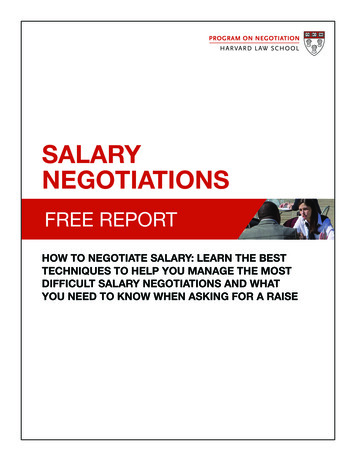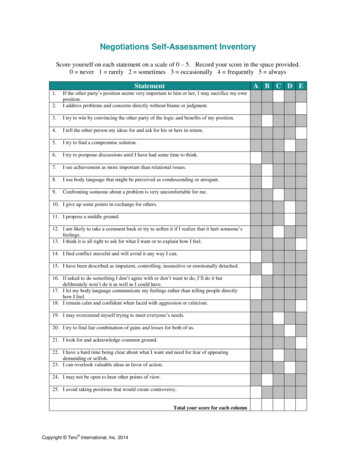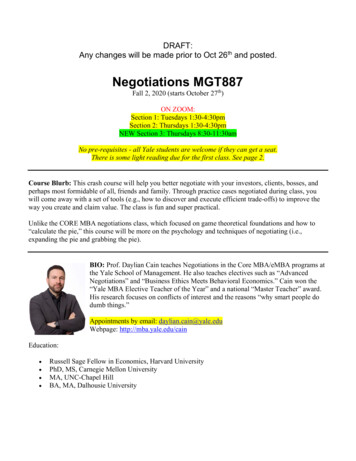
Transcription
SALARYNEGOTIATIONSFREE REPORTHOW TO NEGOTIATE SALARY: LEARN THE BESTTECHNIQUES TO HELP YOU MANAGE THE MOSTDIFFICULT SALARY NEGOTIATIONS AND WHATYOU NEED TO KNOW WHEN ASKING FOR A RAISE
About the Program on Negotiation at Harvard Law SchoolExecutive CommitteeMax BazermanHarvard Business SchoolGabriella BlumHarvard Law SchoolRobert BordoneHarvard Law SchoolJared CurhanMIT Sloan School of ManagementAlain LempereurBrandeis UniversityRobert MnookinHarvard Law SchoolJeswald SalacuseTufts University Fletcher SchoolJames SebeniusHarvard Business SchoolGuhan SubramanianHarvard Business SchoolLawrence SusskindMIT Department of Urban Studies& PlanningWidely recognized as the preeminent leader in the field of negotiation and negotiationresearch, the Program on Negotiation (PON) is an interdisciplinary, multi-universityresearch center based at Harvard Law School. Offering timely executive educationprograms, teaching negotiation resources, the Negotiation Briefings newsletter andNegotiation Journal, special community events, and webinars, PON is a one-stopresource for both aspiring and accomplished negotiators.Our faculty have negotiated peace treaties, brokered multi-billion dollar deals, andhammered out high-stakes agreements around the globe. They are prominent authors,leading researchers, and distinguished professors—many of whom have originated thenegotiation strategies used by many of the world’s must successful leaders and theyteach at PON’s renowned programs: Negotiation and Leadership PON Seminars Harvard Negotiation Institute Summer Programs Negotiation Master ClassLearn more or register at pon.harvard.edu/executive-education/Negotiation Briefings, which serves as the basis for this special report, draws on ideasfrom leading authorities and scholars in the field of negotiation to help you realizegreater success within your team, and with your counterparts, peers and employees.Learn more or subscribe at pon.harvard.edu/publications/Table of ContentsCopyright 2015 by Harvard University. Thispublication may not be reproduced in part orwhole without the express written permissionof the Program on Negotiation. You may notforward this document electronically.Beyond salary: Negotiating for job satisfaction and successPage 2In job negotiations, set yourself up for long-term successPage 5Dear Negotiation Coach: When a job offer is “nonnegotiable”Page 10For a higher salary, choose the right strategyPage 12“So, how much do you make?”Page 14
THREE-DAY SEMINARSTHE CHARLES HOTELCAMBRIDGE, MANEGOTIATIONAND LEADERSHIPDEALING WITH DIFFICULT PEOPLEAND PROBLEMSBECOMING A BETTER NEGOTIATOR STARTS HEREThirty years of groundbreaking research, compressed into threethought-provoking days.Day 1: Discover a framework for thinking about negotiation success.Day 2:negotiation challenges.Day 3: Put it all together and emerge well equipped to negotiate more skillfully,To register online or to download the free Program Guide go towww.executive.pon.harvard.edu
PRO GR A M ON N E G O T I AT IONBeyond salary: Negotiating for job satisfactionand successMost people enter employment negotiations assuming that compensationand benefits are the only issues on the table, according to Negotiation editorialboard member David Lax. By contrast, enlightened job seekers realize theseconcerns are only part of the picture. In addition to negotiating financial terms,you must learn to negotiate for the tools you need to become a fulfilled andwell-compensated person over time.Negotiate for your happiness. Lax has observed that many people overlook thebroader point of employment: satisfaction. It’s true that a well-padded paycheckwill put a bounce in your step, but unless the job brings intrinsic pleasure, theglow will inevitably wear off.Early in our careers, it sometimes makes sense to accept jobs we don’t expectto enjoy. A recent college graduate might sign on for a few grueling years as anentry-level analyst at an investment bank in exchange for long-term knowledgeand contacts. An aspiring chef who can’t afford culinary school will pay his duesas a dishwasher. Later in our careers, however, most of us abandon such extremetradeoffs—as we should, given the amount of time we devote to our jobs.When interviewing for a position, how can you negotiate for yoursatisfaction? First, probe to understand your job responsibilities. How would yoube spending your day? How many people would be working for you? Who wouldyour superiors be? Continue probing until you have a strong sense of your likelywork process.Next, negotiate the “fit.” A prospective office manager with an engagingpersonality might ask whether an administrative assistant could take overbookkeeping duties to free him up for more interactive work. If a prospective2To subscribe to Negotiation Briefings, call 1 800-391-8629, write to negotiation@law.harvard.edu, or visit www.pon.harvard.edu.
PRO GR A M ON N E G O T I AT IONemployer is reluctant to relieve you of tasks youwould not enjoy, this knowledge will help you avoidaccepting a job you’d hate. Remember that wiseemployers recognize that employees perform best attasks they enjoy.In addition, encourage your interviewers tobe candid about any concerns they may have aboutyour qualifications and skills. This type of feedbackmay identify the need for other adjustments to yourjob description, write Deborah M. Kolb, JudithWilliams, and Carol Frohlinger in their book HerPlace at the Table (Jossey-Bass, 2004).Finally, ask questions aimed at assessing theorganization’s political environment.What happened to your predecessor? Was shelet go, and if so, why? If she quit, why? If you discernthat you’d be walking into a political minefield, youmight want to consider other opportunities.Negotiate for your long-term success. “The jobyou’re applying for isn’t your final job,” says Lax.“Rather, it’s setting you up for the next job.” Whenyou make this shift in mindset, you’ll begin to noticeopportunities to build the expertise you will need inyour next job and the one beyond that. Now you cannegotiate for the tools you need to grow and thrive,such as resources, a strong support staff, and a titleWhen short-term salary is not the pointParadoxically, when you focus on your long-termfinancial goals, you may find yourself passing upchances to haggle over your immediate salary.Consider David Lax’s story of an executivewho was interviewing for a position as the CEOof a nonprofit organization that had sufferedsubstantial and increasing losses over anumber of years. Although he was offered anattractive salary, the executive justifiably couldhave asked for more, given his experience andindustry compensation standards. However, hedecided that such a request would have beeninappropriate given the organization’s finances.In fact, the executive decided not to negotiate hissalary at all. Instead, he decided to negotiate forhis future.“What are the tools I need to be a success threeyears from now?” the executive asked himself.The question led him to make up a wish list oforganizational changes that he believed werenecessary to turn the nonprofit around—andto build his own reputation for success. Oneof the items? A request to cut the nonprofit’sboard of directors by more than half to improveorganizational decision making and increase hisauthority. Impressed by this long-term vision, thehiring committee green-lighted the deal termsand made an offer, which the executive accepted.It wasn’t easy, but partway through his three-yearcontract, the CEO had reversed the organization’sfortunes and even created a budget surplus.When his contract was up for renewal, the boardpreemptively offered him a significant raise todiscourage him from thinking about leaving.that will set you up for a future career goal.One tax lawyer in the fundraising arm of anonprofit negotiated her responsibilities to ensure that she remained up-to-dateon changes in tax laws for charitable giving. The organization agreed to send herto industry conferences on the topic, a long-term benefit for the attorney that alsoadded value to the organization.To subscribe to Negotiation Briefings, call 1 800-391-8629, write to negotiation@law.harvard.edu, or visit www.pon.harvard.edu.3
PRO GR A M ON N E G O T I AT IONIn general, employers should be indifferent about spending their moneyon your salary or on benefits you might value more. If added schooling wouldenhance your on-the-job skills, your employer may be willing to pay your tuitionwith pretax dollars at a lower cost than you would pay out of pocket.How far into the future should you look? Choose time horizons basedon your age and experience. Until they find their dream career, recent collegegraduates and MBA students may want to plan only one or two years ahead. Formore established professionals, five-year benchmarks might make more sense.Tailor your strategy to the organization. Suppose you’ve negotiated creativelyfor career satisfaction and success, and you think you want the position. Now it’sfinally time to tackle the nuts and bolts of compensation and benefits.You’ll be well ahead of the curve if you match your negotiating strategy to theorganization’s expectations and characteristics. Consider that large, establishedcompanies such as Coca-Cola and IBM measure job candidates against welldefined job categories with a set range of salaries. In addition, you may negotiatecompensation with recruiters or human-resources personnel rather than withyour future boss.In this environment, unless you’re a senior executive, it wouldn’t make senseto ask for stock options. Instead, try to figure out what pay category someone withyour education and experience would receive, then build a case for a salary at thehigh end of that range.If an interviewer asks you to name your price, how should you respond? Intheir book 3-D Negotiation (Harvard Business School Press, 2006), Lax and JamesSebenius recommend making a “non-offer offer,” or a statement that could anchorthe discussion in your favor without seeming extreme. Suppose your researchsuggests that you would mostly likely fall into the 70,000 to 80,000 pay range,but the next-highest category seems within reach. Rather than saying, “I think Ideserve 80,000,” consider saying, “Correct me if I’m wrong, but I’ve heard thatpeople like me typically earn 80,000 to 90,000.” Notice that this statement is nota demand. Yet due to the powerful impact of the 80,000-to- 90,000 “anchor”—areference point that may or may not be relevant to the discussion—it could verywell steer the numbers toward your upper goal.4To subscribe to Negotiation Briefings, call 1 800-391-8629, write to negotiation@law.harvard.edu, or visit www.pon.harvard.edu.
PRO GR A M ON N E G O T I AT IONNow consider how you might adjust your negotiating strategy to a verydifferent hiring organization: a start-up that is recruiting you to become its thirdemployee. You obviously won’t be shuttled off to the HR department, nor willyour salary be determined by existing pay scales. In this case, you may have morelatitude to structure a creative package that includes stock options.In sum, you can and should negotiate for a number of immediate concernsduring job interviews, including enjoyment, status, compensation, and benefits.Yet it’s just as important to brainstorm creative ways to gain marketable expertise.When it comes to deciding what you want most, the expert advice ends and thesoul-searching begins.First published in Negotiation Briefings, November 2007.In job negotiations, set yourself up forlong-term successStatus concerns, insecurity, and inattentiveness to our bargaining power can preventus from negotiating for a position that will be satisfying over timeWhen you enter a job negotiation, what goals are foremost on your mind?If you’re like most people, you are primarily preoccupied with making a greatimpression and winning the job. Acing the interviews can seem like the onlything that matters, especially if you’ve been out of work or desperate to escape amiserable job.But consider the results of a 2013 Gallup survey of 230,000 employees in142 countries, which found that only 13% of respondents felt engaged by theirjobs. This statistic suggests that many people are capable of getting a job, but notnecessarily one that they will find enjoyable and fulfilling in the long run.To negotiate for employment that we find more than just tolerable, we mustovercome three common traps: (1) mispredicting what we will truly value in life;(2) holding ourselves back in job negotiations; and (3) failing to recognize ourrelative bargaining position.1. We overlook what we truly value. Harvard Business School professor MaxH. Bazerman notes that during recruiting season on the school’s campus eachTo subscribe to Negotiation Briefings, call 1 800-391-8629, write to negotiation@law.harvard.edu, or visit www.pon.harvard.edu.5
PRO GR A M ON N E G O T I AT IONspring, he overhears lots of discussions in the student center about interviews andjob offers. Students might share information about starting salaries, the name ofthe firm, the city where the job is located, their work responsibilities, the amountof travel involved, and so on.What type of information do you think is most likely to travel through theMBA grapevine? According to Bazerman, data that conveys the most prestige,such as a high salary or an offer from a top consulting firm, will probably getthe most attention. The impressed reactions of one’s peers to a job’s high-statusattributes will enhance its appeal to the job candidate. Meanwhile, less flashycharacteristics of the job, such as the freedom to pursue one’s interests or thelength of one’s commute, may recede into the background.Because of their close focus on status, according to Bazerman, many HarvardMBA students end up accepting high-paying jobs with prestigious firms—only to quit soon after and take jobs that are more rewarding on levels thatultimately matter more to them, such as a shorter commute or more interestingresponsibilities.It’s not just newly minted MBAs who fall prey to the so-called vividnessbias, or the tendency to focus too closely on vivid information and overlook dullbut equally valuable information. As Bazerman writes in his book The Powerof Noticing: What the Best Leaders See (Simon & Schuster, 2014), we are allsusceptible to overlooking key information that would improve our satisfactionwith the outcome of our negotiations.How can you get a better sense of what you value? By creating a scoringsystem. A scoring system allows you to weigh different issues, determine howmuch you value each one, and compare them more accurately. A good scoringsystem is complete (it identifies all the important issues), measurable (it provides acommon metric for comparing qualitatively different issues), and useful (it offersa shorthand for understanding what’s at stake and what you value), according toProfessor Don A. Moore of the University of California at Berkeley.To develop your scoring system, begin by listing each issue relevant to agiven job offer on a spreadsheet, such as salary, health insurance, location, andso on. You can add issues to your scoring system as talks unfold. Next, list thepossible options within each issue, such as two, three, and four weeks of vacation.6To subscribe to Negotiation Briefings, call 1 800-391-8629, write to negotiation@law.harvard.edu, or visit www.pon.harvard.edu.
PRO GR A M ON N E G O T I AT IONFinally, establish a point system that can help you determine how much you valuevarious issues. For example, you might assign 50 points to two weeks of vacation,75 to three weeks, and 100 to four weeks. If you receive multiple job offers, followthis process for each one, then add up the points and think about whether theoutcome reflects your true desires.Avoid sharing details about your job prospects with others until after youhave used a scoring system to determine what matters most to you, Bazermanadvises. When you do get feedback from someone, consider whether the reactiontells you anything new. If not, you can feel satisfied with your decision.2. We get in our own way. We also have a somewhat self-destructive tendencyto hold ourselves back in job negotiations. Consider the recent salary negotiationsof Ira Glass, the creator and host of the long-running public-radio show ThisAmerican Life. In 2013, the board of WBEZ, the show’s producer, raised Glass’ssalary from 170,000 to 278,000 to reward his achievements. Glass felt “weird”about the big bump in pay, he told Cara Buckley of the New York Times—so weirdthat he asked the board to lower his salary to 146,000 (less than the startingpoint of the negotiation), and later asked them to lower it again. Though Glasssays he still earns “a lot of money,” he has been booking speaking engagementsaround the edges of his 60- to 70-hour workweek to help cover his and his wife’sliving expenses in New York City. Why would Glass negotiate his salary downrather than up? He apparently felt self-conscious about earning a high salary froma not-for-profit organization funded by grants and listener donations.Negotiation is difficult enough without creating extra roadblocks forourselves. But as this anecdote suggests, that’s exactly what many of us do. Thistendency can be particularly strong in hiring negotiations, where we often feelvulnerable and insecure about our worth.To negotiate more effectively, we have to recognize how we “get in our ownway,” write Simmons School of Management professor emerita Deborah M. Kolband Jessica L. Porter in their new book Negotiating at Work: Turn Small Wins IntoBig Gains (Jossey-Bass, 2015). Pitfalls include failing to recognize opportunitiesto negotiate, focusing on our own weaknesses, and making the first concessionsin our own heads, before we have even given other parties a chance to voice theirTo subscribe to Negotiation Briefings, call 1 800-391-8629, write to negotiation@law.harvard.edu, or visit www.pon.harvard.edu.7
PRO GR A M ON N E G O T I AT IONpositions. That’s what Glass did: He bargained with himself without giving WBEZa voice.Bargaining ourselves down starts with self-doubt about our value to thehiring organization. Before a job negotiation begins, we consider what we want,what we think we can get, and whether we’re willing to fight for it. We think thatthe employer has all the cards—that they are in the driver’s seat and our onlychoices are to acquiesce or reject an offer outright. These internal dialogues arewhere the first concessions in the negotiation are made, write Kolb and Porter.We might decide that we won’t ask for plum assignments for fear of seemingpushy. Or we might decide in advance not to negotiate salary because we want tonegotiate hard on another issue, rather than looking for ways to negotiate aboutmultiple issues that are important to us.When we fail to recognize our own value, we are vulnerable to accepting lessthan we’re entitled to and even to giving back what the organization believes wedeserve, as Glass did. It’s important to be fair to your employer, but you also needto be fair to yourself.In addition, our beliefs about what will satisfy someone are not necessarilycorrect. Glass’s employer, for example, might have preferred that he accept a raisethat would enable him to focus fully on his work without the need to overtaxhimself with side jobs.Kolb and Porter suggest ways that you can position yourself to be a moreeffective self-advocate. Begin by gathering information so that you will feel thatwhat you are asking for is defensible. Prepare to explain the value you would bringto the organization. Develop alternatives to the current negotiation to increaseyour flexibility at the table, and remember that the other party’s alternatives maybe less attractive than yours. In addition, examine your vulnerabilities and planahead to compensate for them. For example, if you are insecure about a gap inyour work history, think about the important things you were doing during thattime and prepare to share them with enthusiasm.3. We fail to recognize our relative bargaining power. Job seekers, and womenin particular, recently have been so inundated with the message that they fail tonegotiate forcefully for themselves that they face the risk of overcompensating.8To subscribe to Negotiation Briefings, call 1 800-391-8629, write to negotiation@law.harvard.edu, or visit www.pon.harvard.edu.
PRO GR A M ON N E G O T I AT IONTake the now-infamous story, related on the blog Philosophy Smoker in 2014, ofan anonymous academic who said she had received an offer for a tenure-trackposition as a philosophy professor from a small liberal-arts college after a roundof interviews. The woman responded to the offer by e-mail, sending a list ofnumerous requests—for a salary increase, a semester of maternity leave, a pretenure sabbatical, and so on. Rather than continuing the negotiation, the collegerevoked the job offer, saying it appeared the candidate was looking to work for aresearch university rather than a teaching-focused college.The woman was dismayed and confused by her negotiation failure. But herprincipal mistake was an obvious one: She failed to recognize the strength of herbargaining position relative to that of the college, says Kolb. In the job market forphilosophy professors, a hiring college is clearly in the better bargaining position. Itlikely has received applications from hundreds of qualified candidates. Meanwhile,the average job candidate might be lucky to get even one interview. Consequently,a job candidate who presents a list of requests or demands is giving the hiringcollege a good reason to end the negotiation and turn to other candidates.The philosophy candidate’s list was also risky because it had a commontheme—requests for time off from teaching—that may have given the impressionshe wouldn’t be a hardworking teacher. Negotiating via e-mail is also usually amistake in such situations, as it tends to be less collaborative.Savvy job seekers remember to treat the negotiation as the beginning ofa long-term relationship. You can get that relationship off on the right foot bylooking for opportunities to give the employer what it wants even as you seek toget what you want.Begin by using your network to gather information, advises Kolb. Thephilosophy job candidate, for example, could have consulted with her fellowgraduate students or an online group about how much leeway she might havein negotiating her job offer. Then, rather than e-mailing a list of requests, sheshould have called her contact at the college (or, if possible, met in person) andstarted asking questions, advises Kolb. For example, she might have asked aboutthe college’s early-career sabbatical policy. What criteria do they use to awardit? Then she could have looked for ways to make an early sabbatical palatable toTo subscribe to Negotiation Briefings, call 1 800-391-8629, write to negotiation@law.harvard.edu, or visit www.pon.harvard.edu.9
PRO GR A M ON N E G O T I AT IONthe college, again by asking questions. She could have asked if she could teachextra courses before taking the leave, for example, or give undergraduate studentsopportunities to get involved with her research while on sabbatical.Prioritizing is key, as well. Referring back to your scoring system, think aboutthe issues that matter most to you. Focus on two or three of them during yournegotiations rather than overwhelming the other side with a list of demands. Lessimportant issues can wait until after you’ve been on the job for a while and provenyour value to the organization.First published in Negotiation Briefings, December 2014.3. Dear Negotiation Coach:When a job offer is “nonnegotiable”Question:I am in my final year of business school and starting to prepare for jobinterviews. I have heard many of the organizations that recruit on campus are notopen to negotiating specific terms of employment. Rather, they offer everyoneroughly the same deal terms. To what extent should I respect such conventionsversus trying to negotiate better terms for myself?Answer:As you’ve heard, firms that hire a large number of college or professionalschool graduates into entry-level positions tend to offer standard packages andavoid negotiating with new recruits. If a firm hires more than four or five peopleeach cycle and has hired “classes” of new employees with similar qualifications foryears, you may have little room to negotiate your offer.In fact, negotiating aggressively in the face of a standard package could causethe employer to sour on you and retract the offer. If you are still hired, any gainsthat you negotiate could come at the expense of future pay increases, bonuses, orother perks.Although negotiation isn’t encouraged in such situations, it isn’t forbidden.Here are a few tips to help you get a better offer:10To subscribe to Negotiation Briefings, call 1 800-391-8629, write to negotiation@law.harvard.edu, or visit www.pon.harvard.edu.
PRO GR A M ON N E G O T I AT ION1. Probe for signs of flexibility. Often, by doing some research, you canuncover areas where potential employers may be flexible. For example, if acompany wants to stagger the start dates of a group of new hires, managementmight be willing to accommodate your preference for a certain start date. If youhave special expertise or experience, you could ask your interviewers if you mightqualify for a more senior position. You might also find that volunteering for aparticular role or agreeing to move to a less popular location could qualify you fora customized package.2. Take a long-term perspective. Ideally, you will face the task of comparingjob offers from multiple organizations. When doing so, most candidates focus onsalary, bonus potential, and other “year one” items, such as a signing bonus. Butwhat happens after year one?With a little research—such as calling alums from your school who haveworked for the firm for several years, or asking your interviewers directly—youcan get more information on trend lines. For example, Company A’s 80,000salary might sound better than Company B’s offer of 70,000. But if you learn thatCompany A provides only cost-of-living raises, and Company B offers much moregenerous pay increases, the salary issue may level out or even reverse.3. Create a scoring system. The number of factors at stake in a job decisioncan be overwhelming: role, location, department, pay package, amount of travelrequired, and so on. Job candidates often find that they can effectively determinewhich issues matter most to them by creating a scoring system by which they cancompare the various issues at stake. After weighing all the known elements of ajob and likely trend lines, you might decide to negotiate the one or two issues thatare most important to you.4. Demonstrate flexibility. Because organizations are often hamstrung bypolicies and procedures, your interviewers are likely to appreciate some flexibilityfrom you regarding how they meet your interests. You might explain that itmatters little to you how the total dollars that you earn your first year on thejob are divided up—among base salary, signing bonus, year-end bonus, andeducational-loan repayment, for example.To subscribe to Negotiation Briefings, call 1 800-391-8629, write to negotiation@law.harvard.edu, or visit www.pon.harvard.edu.11
PRO GR A M ON N E G O T I AT IONIn addition, think about how you might deliver more value to your employer.If you had hoped for a break between school and work, but they need someone tostart right away, you might agree to start immediately in return for an extra twoweeks off after the busy season. Such relatively minor concessions could inspireemployers to reciprocate with flexibility on issues that matter more to you.Kevin P. MohanSenior LecturerHarvard Business SchoolFirst published in Negotiation Briefings, December 2013.For a higher salary, choose the right strategyBoth employers and applicants alike tend to recognize that it pays to bringa variety of issues to the table during a job negotiation, such as vacation time,location, and growth opportunities. Yet there’s one factor that looms largestover such talks: salary, and with good reason. For a new employee, negotiating asalary offer up by 5,000 could make a huge difference over the course of a career.A 25-year-old employee who enters the job market at 55,000 will earn about 634,000 more over the course of a 40-year career (assuming annual 5% raises)than an employee who starts out at 50,000.But not everyone negotiates for higher pay when offered a job, and somewho do are dissatisfied with the final outcome. As it turns out, individualdifferences—such as gender, negotiating style, and tolerance for risk—determinehow we approach starting salary negotiations and what we achieve, MichelleMarks of George Mason University and Crystal Harold of Temple Universityfound in a recent study.Surveying salary. The researchers surveyed 149 professional employees whohad been hired in the previous three years—specifically, tenure-track faculty at12To subscribe to Negotiation Briefings, call 1 800-391-8629, write to negotiation@law.harvard.edu, or visit www.pon.harvard.edu.
PRO GR A M ON N E G O T I AT IONa university and part-time MBA students—about their negotiations for theircurrent position. The participants were questioned about their attitudes towardnegotiation and risk, their negotiation strategies and outcomes, and their level ofsatisfaction with the process of negotiating for their jobs. In addition, their degreeof power in the negotiation was measured based on their work experience, otherjob offers, and knowledge of the organization’s past salary offers.The researchers identified five types of negotiating strategies: collaborating(engaging in problem solving to reach the best possible outcome for both sides);competing (trying to maximize one’s own outcomes with little c
PROGRAM ON NEGOTIATION 2 To subscribe to Negotiation Briefings, call 1 800-391-8629, write to negotiation@law.harvard.edu, or visit www.pon.harvard.edu. Beyond salary: Negotiating for job satisfaction and success Most people enter employment negotiations assuming that compensation and benefits are the only issues on the table, according to Negotiation editorial










